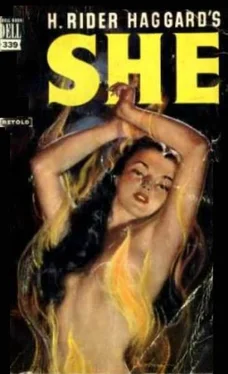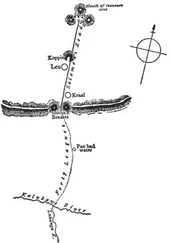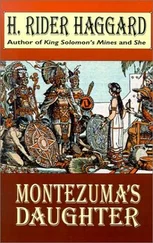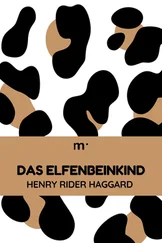Henry Haggard - She
Здесь есть возможность читать онлайн «Henry Haggard - She» весь текст электронной книги совершенно бесплатно (целиком полную версию без сокращений). В некоторых случаях можно слушать аудио, скачать через торрент в формате fb2 и присутствует краткое содержание. Жанр: Прочие приключения, на английском языке. Описание произведения, (предисловие) а так же отзывы посетителей доступны на портале библиотеки ЛибКат.
- Название:She
- Автор:
- Жанр:
- Год:неизвестен
- ISBN:нет данных
- Рейтинг книги:5 / 5. Голосов: 1
-
Избранное:Добавить в избранное
- Отзывы:
-
Ваша оценка:
- 100
- 1
- 2
- 3
- 4
- 5
She: краткое содержание, описание и аннотация
Предлагаем к чтению аннотацию, описание, краткое содержание или предисловие (зависит от того, что написал сам автор книги «She»). Если вы не нашли необходимую информацию о книге — напишите в комментариях, мы постараемся отыскать её.
She — читать онлайн бесплатно полную книгу (весь текст) целиком
Ниже представлен текст книги, разбитый по страницам. Система сохранения места последней прочитанной страницы, позволяет с удобством читать онлайн бесплатно книгу «She», без необходимости каждый раз заново искать на чём Вы остановились. Поставьте закладку, и сможете в любой момент перейти на страницу, на которой закончили чтение.
Интервал:
Закладка:
Of course we got up at once, and started. And here again my pen fails me. To give a string of measurements and details of the various courts of the temple would only be wearisome, supposing that I had them, and yet I know not how I am to describe what we saw, magnificent as it was even in its ruin, almost beyond the power of realisation. Court upon dim court, row upon row of mighty pillars—some of them (especially at the gateways) sculptured from pedestal to capital—space upon space of empty chambers that spoke more eloquently to the imagination than any crowded streets. And over all, the dead silence of the dead, the sense of utter loneliness, and the brooding spirit of the Past! How beautiful it was, and yet how drear! We did not dare to speak aloud. Ayesha herself was awed in the presence of an antiquity compared to which even her length of days was but a little thing; we only whispered, and our whispers seemed to run from column to column, till they were lost in the quiet air. Bright fell the moonlight on pillar and court and shattered wall, hiding all their rents and imperfections in its silver garment, and clothing their hoar majesty with the peculiar glory of the night. It was a wonderful sight to see the full moon looking down on the ruined fane of Kôr. It was a wonderful thing to think for how many thousands of years the dead orb above and the dead city below had gazed thus upon each other, and in the utter solitude of space poured forth each to each the tale of their lost life and long-departed glory. The white light fell, and minute by minute the quiet shadows crept across the grass-grown courts like the spirits of old priests haunting the habitations of their worship—the white light fell, and the long shadows grew till the beauty and grandeur of each scene and the untamed majesty of its present Death seemed to sink into our very souls, and speak more loudly than the shouts of armies concerning the pomp and splendour that the grave had swallowed, and even memory had forgotten.
“Come,” said Ayesha, after we had gazed and gazed, I know not for how long, “and I will show you the stony flower of Loveliness and Wonder’s very crown, if yet it stands to mock time with its beauty and fill the heart of man with longing for that which is behind the veil,” and, without waiting for an answer, she led us through two more pillared courts into the inner shrine of the old fane.
And there, in the centre of the inmost court, that might have been some fifty yards square, or a little more, we stood face to face with what is perhaps the grandest allegorical work of Art that the genius of her children has ever given to the world. For in the exact centre of the court, placed upon a thick square slab of rock, was a huge round ball of dark stone, some twenty feet in diameter, and standing on the ball was a colossal winged figure of a beauty so entrancing and divine that when I first gazed upon it, illuminated and shadowed as it was by the soft light of the moon, my breath stood still, and for an instant my heart ceased its beating.
The statue was hewn from marble so pure and white that even now, after all those ages, it shone as the moonbeams danced upon it, and its height was, I should say, a trifle over twenty feet. It was the winged figure of a woman of such marvellous loveliness and delicacy of form that the size seemed rather to add to than to detract from its so human and yet more spiritual beauty. She was bending forward and poising herself upon her half-spread wings as though to preserve her balance as she leant. Her arms were outstretched like those of some woman about to embrace one she dearly loved, while her whole attitude gave an impression of the tenderest beseeching. Her perfect and most gracious form was naked, save—and here came the extraordinary thing—the face, which was thinly veiled, so that we could only trace the marking of her features. A gauzy veil was thrown round and about the head, and of its two ends one fell down across her left breast, which was outlined beneath it, and one, now broken, streamed away upon the air behind her.
“Who is she?” I asked, as soon as I could take my eyes off the statue.
“Canst thou not guess, oh Holly?” answered Ayesha. “Where then is thy imagination? It is Truth standing on the World, and calling to its children to unveil her face. See what is writ upon the pedestal. Without doubt it is taken from the book of Scriptures of these men of Kôr,” and she led the way to the foot of the statue, where an inscription of the usual Chinese-looking hieroglyphics was so deeply graven as to be still quite legible, at least to Ayesha. According to her translation it ran thus:—
“Is there no man that will draw my veil and look upon my face, for it is very fair? Unto him who draws my veil shall I be, and peace will I give him, and sweet children of knowledge and good works.”
And a voice cried, “Though all those who seek after thee desire thee, behold! Virgin art thou, and Virgin shalt thou go till Time be done. No man is there born of woman who may draw thy veil and live, nor shall be. By Death only can thy veil be drawn, oh Truth!”
And Truth stretched out her arms and wept, because those who sought her might not find her, nor look upon her face to face.
“Thou seest,” said Ayesha, when she had finished translating, “Truth was the Goddess of the people of old Kôr, and to her they built their shrines, and her they sought; knowing that they should never find, still sought they.”
“And so,” I added sadly, “do men seek to this very hour, but they find out; and, as this Scripture saith, nor shall they; for in Death only is Truth found.”
Then with one more look at this veiled and spiritualised loveliness—which was so perfect and so pure that one might almost fancy that the light of a living spirit shone through the marble prison to lead man on to high and ethereal thoughts—this poet’s dream of beauty frozen into stone, which I shall never forget while I live, we turned and went back through the vast moonlit courts to the spot whence we had started. I never saw the statue again, which I the more regret, because on the great ball of stone representing the World whereon the figure stood, lines were drawn, that probably, had there been light enough, we should have discovered to be a map of the Universe as it was known to the people of Kôr. It is at any rate suggestive of some scientific knowledge that these long-dead worshippers of Truth had recognised the fact that the globe is round.
XXIV
Walking the Plank
Next day the mutes woke us before the dawn; and by the time that we had got the sleep out of our eyes, and gone through a perfunctory wash at a spring which still welled up into the remains of a marble basin in the centre of the North quadrangle of the vast outer court, we found She standing by the litter ready to start, while old Billali and the two bearer mutes were busy collecting the baggage. As usual, Ayesha was veiled like the marble Truth (by the way, I wonder if she originally got the idea of covering up her beauty from that statue?). I noticed, however, that she seemed very depressed, and had none of that proud and buoyant bearing which would have betrayed her among a thousand women of the same stature, even if they had been veiled like herself. She looked up as we came—for her head was bowed—and greeted us. Leo asked her how she had slept.
“Ill, my Kallikrates,” she answered, “ill. This night have strange and hideous dreams come creeping through my brain, and I know not what they may portend. Almost do I feel as though some evil overshadowed me; and yet how can evil touch me? I wonder,” she went on with a sudden outbreak of womanly tenderness, “I wonder if, should aught happen to me, so that I slept awhile and left thee waking, thou wouldst think gently of me? I wonder, my Kallikrates, if thou wouldst tarry till I came again, as for so many centuries I have tarried for thy coming?”
Читать дальшеИнтервал:
Закладка:
Похожие книги на «She»
Представляем Вашему вниманию похожие книги на «She» списком для выбора. Мы отобрали схожую по названию и смыслу литературу в надежде предоставить читателям больше вариантов отыскать новые, интересные, ещё непрочитанные произведения.
Обсуждение, отзывы о книге «She» и просто собственные мнения читателей. Оставьте ваши комментарии, напишите, что Вы думаете о произведении, его смысле или главных героях. Укажите что конкретно понравилось, а что нет, и почему Вы так считаете.












